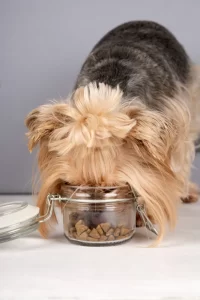Why Nutrition Matters for Yorkies
Yorkshire Terriers may be small in size, but their nutritional needs are big and specific. A balanced diet is essential for maintaining their silky coats, lively personalities, and overall health. Without the right food, Yorkies are prone to issues like hypoglycemia, digestive sensitivity, and dental problems.
A well-rounded diet doesn’t just fuel their bodies; it also supports their immune system and helps them maintain strong bones and muscles. Because Yorkies are such energetic little dogs, they need high-quality calories that keep them active without leading to unhealthy weight gain.
When I first brought Bonnie home, I quickly learned that what she ate made a huge difference in her energy levels and coat condition. Switching to a high-quality, balanced diet transformed her from a picky eater into a thriving, vibrant pup.
Key Nutritional Needs for Yorkies
Protein sits at the top of the priority list for Yorkie nutrition. Lean meats like chicken, turkey, and fish provide the essential amino acids that build muscle and support healthy growth. Without enough protein, your Yorkie may feel sluggish and lose muscle tone.
Fats are another essential component. Omega-3 and Omega-6 fatty acids contribute to healthy skin and that beautiful glossy coat Yorkies are famous for. They also supply energy, which is particularly important since Yorkies tend to burn calories quickly.
Carbohydrates, when chosen carefully, provide an additional energy source and aid digestion. Whole grains like brown rice or oats, as well as vegetables, add fiber and nutrients. However, it’s important to avoid fillers like corn or soy, which offer little nutritional value.

Choosing Between Commercial and Homemade Diets
One of the biggest decisions Yorkie owners face is whether to feed commercial dog food or prepare homemade meals. Both options can work well, provided you choose carefully and prioritize balance.
High-quality commercial foods are convenient and often formulated with the specific needs of small breeds in mind. Look for brands that list real meat as the first ingredient, contain healthy fats, and avoid artificial colors or preservatives. Small kibble sizes are also better suited for tiny Yorkie mouths.
Homemade diets give you more control over ingredients, which can be beneficial if your Yorkie has allergies or sensitivities. However, it’s crucial to consult with a vet or canine nutritionist before switching to homemade meals. Without professional guidance, it’s easy to miss essential vitamins and minerals.

The Role of Portion Control
Because of their small size, Yorkies are particularly vulnerable to overfeeding. Even a few extra bites here and there can add up quickly, leading to obesity. On the flip side, underfeeding can cause hypoglycemia, especially in puppies.
Portion control is about finding the sweet spot. Generally, an adult Yorkie needs about 150–200 calories per day, depending on activity level. Dividing meals into two or three small servings prevents energy crashes and keeps blood sugar stable.
I found that Bonnie does best with three smaller meals spread throughout the day. It helps her maintain steady energy, and she looks forward to her mealtimes with excitement. Measuring her food instead of eyeballing portions has made a big difference in maintaining her ideal weight.

Common Foods to Avoid
Some foods are downright dangerous for Yorkies, and every owner should know what to keep far away from their pup’s bowl. Chocolate tops the list, as it contains theobromine, which is toxic to dogs. Even small amounts can cause serious health issues.
Other harmful foods include grapes, raisins, onions, garlic, and anything with xylitol (a sugar substitute). These can lead to kidney failure, anemia, or dangerously low blood sugar. Even foods like avocado and macadamia nuts pose risks and should be avoided.
I once learned the hard way when Bonnie tried to sneak a grape that fell on the floor. Thankfully, I caught it in time, but it was a reminder that vigilance is key. Now, I keep a mental list of off-limits foods and make sure everyone in my household knows it too.
Supplements for a Healthier Yorkie
While a balanced diet should provide most of the nutrients your Yorkie needs, supplements can be helpful in certain cases. Fish oil supplements, for example, support coat health and reduce inflammation. Probiotics aid digestion and can prevent tummy troubles.
Calcium and vitamin D supplements may be necessary for Yorkies prone to weak bones, though it’s important to check with your vet before adding them. Over-supplementation can be just as harmful as deficiencies.
I started giving Bonnie a small daily probiotic after she experienced some digestive issues. The difference was noticeable—she had less bloating and seemed more comfortable overall. However, I always double-check with her vet before introducing anything new.
WE RECOMMEND:
Omega 3 Fish Oil for Dogs
8 ounces Liquid
4.4 Stars on Amazon! GET IT HERE
- Better Than Salmon Oil.
- Dog Fish Oil Supplement to Reduce Shedding & Itching.
- Supports Joints, Brain, and Heart Health.
- Skin and Coat Supplement.
- Active Ingredients: Anchovies, Herring, Mackerel, Sardines.
WE RECOMMEND:
Pfizer Animal Pet-Tinic Vitamin-Mineral Supplement for Dogs and Cats, 4-Ounce by Pfizer Animal
4.6 Stars on Amazon! GET IT HERE
- 1.58 ounces.
- 5 x 2 x 2 inches.
Special Considerations for Puppies and Seniors
Puppy Yorkies need more frequent meals than adults to avoid hypoglycemia. Their diets should be rich in protein and healthy fats to support rapid growth. Dividing their daily intake into four meals is often recommended during the first few months.
Senior Yorkies, on the other hand, may require fewer calories but still need nutrient-dense food. Joint-supporting supplements like glucosamine and chondroitin can help older dogs maintain mobility. Soft food or smaller kibble may also be easier for seniors with dental issues.
With Bonnie, I’ve already noticed that her needs shifted as she grew from a puppy into an adult. I’ve adjusted her meal frequency and portion sizes accordingly, and I know I’ll need to keep monitoring as she ages. Nutrition truly evolves over a Yorkie’s lifetime.

Hydration and Its Importance
Water is an often-overlooked part of nutrition, but it’s just as important as food. Yorkies should always have access to fresh, clean water throughout the day. Proper hydration supports digestion, regulates body temperature, and helps flush toxins from the body.
Yorkies can sometimes be picky drinkers, so making water more appealing helps. I keep Bonnie’s water bowl fresh and cool, and occasionally add a splash of low-sodium chicken broth if she seems reluctant to drink.
Dehydration can be serious in such a small breed, leading to lethargy and even organ problems. Watching Bonnie’s water intake has become part of my daily routine, especially during hot summer months or after long walks.
Transitioning to a New Diet Safely
Changing your Yorkie’s diet requires patience and a gradual approach. Switching food too quickly can cause stomach upset, diarrhea, or refusal to eat. The best method is to transition over 7–10 days by slowly mixing the new food with the old.
Start with 25% new food and 75% old food for a couple of days, then increase the new food to 50%. Continue increasing until the old food is phased out completely. This slow transition allows your Yorkie’s digestive system to adjust smoothly.
When I switched Bonnie’s food to a grain-free option, I followed this exact process. Not only did it prevent tummy troubles, but it also helped her accept the new taste without fuss. Rushing the process would have made it stressful for both of us.

A Sample Daily Meal Plan for Yorkies
To bring it all together, here’s an example of a balanced daily diet plan:
- Breakfast: A small portion of high-quality kibble with added boiled chicken.
- Midday Meal: A few spoonfuls of cooked vegetables like carrots or green beans mixed with protein.
- Dinner: A portion of kibble topped with fish or turkey and a drizzle of fish oil for coat health.
Treats can be added in moderation for training or rewards, but they should not exceed 10% of the daily calorie intake. Fresh water should always be available.
This plan mirrors what I feed Bonnie most days, and it keeps her energetic, shiny-coated, and satisfied. It’s flexible enough to adjust based on activity level, age, and health needs.
Final Thoughts on Balanced Diets
Feeding a Yorkie isn’t just about filling their bowl; it’s about providing the building blocks for a long, happy, and healthy life. From portion control to avoiding toxic foods, every detail matters.
Positive dietary habits established early will carry your Yorkie into adulthood and senior years with fewer health issues. Remember, what works for one Yorkie may not work for another, so observation and adjustments are key.
Bonnie has taught me that nutrition is not one-size-fits-all. With patience, research, and a little trial and error, I’ve built a diet that keeps her thriving—and that’s ultimately what every Yorkie owner wants.








